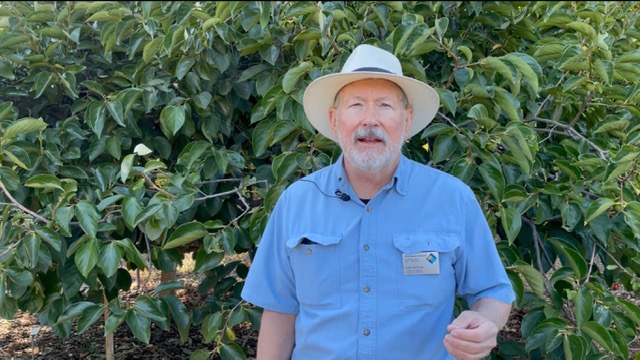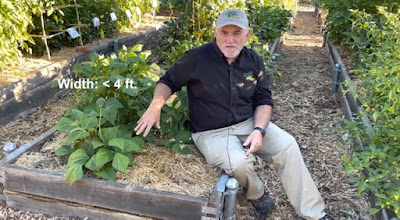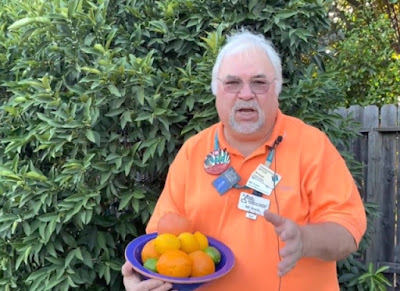
Three experts cover key gardening topics

|
| Fred Hoffman talks about year-round gardening in a new Harvest Day 2021 video. (Screenshots from YouTube) |
Harvest Day 2021 already is underway! The Sacramento County UCCE master gardeners' annual celebration is virtual again this year, on Aug. 7, but the three keynote speeches are already available for viewing on the master gardeners' YouTube channel .
-- "Farmer Fred" Hoffman, podcast host and lifetime master gardener, talks about "Gardening Year Round," focusing especially on growing cool-season vegetables that can be started from seed soon. Check out the nifty "damp chopstick" method of planting tiny carrot or radish seeds.

|
|
Greg Gayton offers recommendations for building raised beds.
|
-- Master gardener Bill Krycia is "Jazzed About Citrus" and wants everyone to be. He explains rootstock suckers, site selection and winterizing, among other citrus-specific issues.
If you watch these videos now, you'll be all prepared for the live Q&A sessions to be aired on Harvest Day itself, Aug. 7. Here's the schedule:
8:30 - 9 a.m. - Fred Hoffman
9:10 - 9:40 a.m. - Greg Gayton

|
|
Bill Krycia explains some of the mysteries of citrus growing.
|
Register for the live events and webinars at the Harvest Day page of the Sacramento County master gardeners' website. The page also has links to last year's videos.
The three webinars planned for this year are:
-- 10:30 - 11:10 a.m., "Unusual Edibles in the Central Valley," Quentyn Young, Master Gardener and Manager, Fair Oaks Boulevard Nursery.
-- 11:20 a.m.- noon, "Tips for Houseplant Selection and Care," Lori Ann Asmus, Master Gardener and Owner, The Emerald City Interior Landscaping.
-- 12-10 - 12:50 p.m., "Growing Bearded Irises in the Home Garden," Ruth Ostroff, Master Gardener, Sacramento Iris Society.
-- Kathy Morrison
Comments
0 comments have been posted.Sacramento Digs Gardening to your inbox.
Food in My Back Yard Series
April 1: Don't be fooled by these garden myths
March 25: Fertilizer tips: How to 'feed' your vegetables for healthy growth
March 18: Time to give vegetable seedlings some more space
March 11: Ways to win the fight against weeds
March 4: Potatoes from the garden
Feb. 25: Plant a fruit tree now -- for later
Feb. 18: How to squeeze more food into less space
Feb. 11: When to plant? Consider staggering your transplants
Feb. 4: Starting in seed starting
Sites We Like
Garden Checklist for week of March 30
Your garden doesn’t mind April showers. Get busy now to enjoy those future flowers.
* Get ready to swing into action in the vegetable garden. As nights warm up over 50 degrees, start setting out tomato, pepper and eggplant transplants.
* From seed, plant beans, beets, cantaloupes, carrots, corn, cucumbers, melons, pumpkins, radishes and squash. (Soak beet seeds overnight in water for better germination,)
* Plant onion sets.
* In the flower garden, plant seeds for asters, cosmos, celosia, marigolds, salvia, sunflowers and zinnias.
* Transplant petunias, zinnias, geraniums and other summer bloomers.
* Plant perennials and dahlia tubers for summer bloom.
* Transplant lettuce and cabbage seedlings.
* April is the last chance to plant citrus trees such as dwarf orange, lemon and kumquat. These trees also look good in landscaping and provide fresh fruit in winter.
* Smell orange blossoms? Feed citrus trees with a low dose of balanced fertilizer (such as 10-10-10) during bloom to help set fruit. Keep an eye out for ants.
* Apply slow-release fertilizer to the lawn.